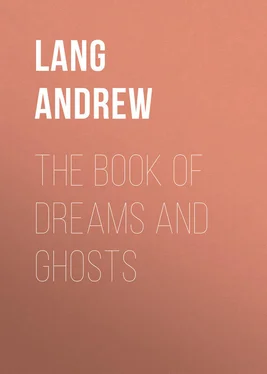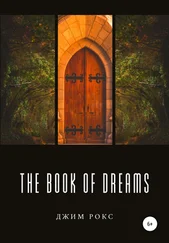Andrew Lang - The Book of Dreams and Ghosts
Здесь есть возможность читать онлайн «Andrew Lang - The Book of Dreams and Ghosts» — ознакомительный отрывок электронной книги совершенно бесплатно, а после прочтения отрывка купить полную версию. В некоторых случаях можно слушать аудио, скачать через торрент в формате fb2 и присутствует краткое содержание. Жанр: foreign_antique, foreign_prose, на английском языке. Описание произведения, (предисловие) а так же отзывы посетителей доступны на портале библиотеки ЛибКат.
- Название:The Book of Dreams and Ghosts
- Автор:
- Жанр:
- Год:неизвестен
- ISBN:нет данных
- Рейтинг книги:4 / 5. Голосов: 1
-
Избранное:Добавить в избранное
- Отзывы:
-
Ваша оценка:
- 80
- 1
- 2
- 3
- 4
- 5
The Book of Dreams and Ghosts: краткое содержание, описание и аннотация
Предлагаем к чтению аннотацию, описание, краткое содержание или предисловие (зависит от того, что написал сам автор книги «The Book of Dreams and Ghosts»). Если вы не нашли необходимую информацию о книге — напишите в комментариях, мы постараемся отыскать её.
The Book of Dreams and Ghosts — читать онлайн ознакомительный отрывок
Ниже представлен текст книги, разбитый по страницам. Система сохранения места последней прочитанной страницы, позволяет с удобством читать онлайн бесплатно книгу «The Book of Dreams and Ghosts», без необходимости каждый раз заново искать на чём Вы остановились. Поставьте закладку, и сможете в любой момент перейти на страницу, на которой закончили чтение.
Интервал:
Закладка:
Andrew Lang
The Book of Dreams and Ghosts
PREFACE TO THE NEW IMPRESSION
Since the first edition of this book appeared (1897) a considerable number of new and startling ghost stories, British, Foreign and Colonial, not yet published, have reached me. Second Sight abounds. Crystal Gazing has also advanced in popularity. For a singular series of such visions, in which distant persons and places, unknown to the gazer, were correctly described by her, I may refer to my book, The Making of Religion (1898). A memorial stone has been erected on the scene of the story called “The Foul Fords” (p. 269), so that tale is likely to endure in tradition.
July , 1899.
PREFACE TO THE FIRST EDITION
The chief purpose of this book is, if fortune helps, to entertain people interested in the kind of narratives here collected. For the sake of orderly arrangement, the stories are classed in different grades, as they advance from the normal and familiar to the undeniably startling. At the same time an account of the current theories of Apparitions is offered, in language as free from technicalities as possible. According to modern opinion every “ghost” is a “hallucination,” a false perception, the perception of something which is not present.
It has not been thought necessary to discuss the psychological and physiological processes involved in perception, real or false. Every “hallucination” is a perception, “as good and true a sensation as if there were a real object there. The object happens not to be there, that is all.” 1 1 Principles of Psychology , vol. ii., p. 115. By Professor William James, Harvard College, Macmillan’s, London, 1890. The physical processes believed to be involved, are described on pp. 123, 124 of the same work.
We are not here concerned with the visions of insanity, delirium, drugs, drink, remorse, or anxiety, but with “sporadic cases of hallucination, visiting people only once in a lifetime, which seems to be by far the most frequent type”. “These,” says Mr. James, “are on any theory hard to understand in detail. They are often extraordinarily complete; and the fact that many of them are reported as veridical , that is, as coinciding with real events, such as accidents, deaths, etc., of the persons seen, is an additional complication of the phenomenon.” 2 2 Op. cit ., ii., 130.
A ghost, if seen, is undeniably so far a “hallucination” that it gives the impression of the presence of a real person, in flesh, blood, and usually clothes. No such person in flesh, blood, and clothes, is actually there. So far, at least, every ghost is a hallucination, “ that ” in the language of Captain Cuttle, “you may lay to,” without offending science, religion, or common-sense. And that, in brief, is the modern doctrine of ghosts.
The old doctrine of “ghosts” regarded them as actual “spirits” of the living or the dead, freed from the flesh or from the grave. This view, whatever else may be said for it, represents the simple philosophy of the savage, which may be correct or erroneous. About the time of the Reformation, writers, especially Protestant writers, preferred to look on apparitions as the work of deceitful devils, who masqueraded in the aspect of the dead or living, or made up phantasms out of “compressed air”. The common-sense of the eighteenth century dismissed all apparitions as “dreams” or hoaxes, or illusions caused by real objects misinterpreted, such as rats, cats, white posts, maniacs at large, sleep-walkers, thieves, and so forth. Modern science, when it admits the possibility of occasional hallucinations in the sane and healthy, also admits, of course, the existence of apparitions. These, for our purposes, are hallucinatory appearances occurring in the experience of people healthy and sane. The difficulty begins when we ask whether these appearances ever have any provoking mental cause outside the minds of the people who experience them – any cause arising in the minds of others, alive or dead. This is a question which orthodox psychology does not approach, standing aside from any evidence which may be produced.
This book does not pretend to be a convincing, but merely an illustrative collection of evidence. It may, or may not, suggest to some readers the desirableness of further inquiry; the author certainly does not hope to do more, if as much.
It may be urged that many of the stories here narrated come from remote times, and, as the testimony for these cannot be rigidly studied, that the old unauthenticated stories clash with the analogous tales current on better authority in our own day. But these ancient legends are given, not as evidence, but for three reasons: first, because of their merit as mere stories; next, because several of them are now perhaps for the first time offered with a critical discussion of their historical sources; lastly, because the old legends seem to show how the fancy of periods less critical than ours dealt with such facts as are now reported in a dull undramatic manner. Thus (1) the Icelandic ghost stories have peculiar literary merit as simple dramatic narratives. (2) Every one has heard of the Wesley ghost, Sir George Villiers’s spectre, Lord Lyttelton’s ghost, the Beresford ghost, Mr. Williams’s dream of Mr. Perceval’s murder, and so forth. But the original sources have not, as a rule, been examined in the ordinary spirit of calm historical criticism, by aid of a comparison of the earliest versions in print or manuscript. (3) Even ghost stories, as a rule, have some basis of fact, whether fact of hallucination, or illusion, or imposture. They are, at lowest, “human documents”. Now, granting such facts (of imposture, hallucination, or what you will), as our dull, modern narratives contain, we can regard these facts, or things like these, as the nuclei which our less critical ancestors elaborated into their extraordinary romances. In this way the belief in demoniacal possession (distinguished, as such, from madness and epilepsy) has its nucleus, some contend, in the phenomena of alternating personalities in certain patients. Their characters, ideas, habits, and even voices change, and the most obvious solution of the problem, in the past, was to suppose that a new alien personality – a “devil” – had entered into the sufferer.
Again, the phenomena occurring in “haunted houses” (whether caused, or not, by imposture or hallucination, or both) were easily magnified into such legends as that of Grettir and Glam, and into the monstrosities of the witch trials. Once more the simple hallucination of a dead person’s appearance in his house demanded an explanation. This was easily given by evolving a legend that he was a spirit, escaped from purgatory or the grave, to fulfil a definite purpose. The rarity of such purposeful ghosts in an age like ours, so rich in ghost stories, must have a cause. That cause is, probably, a dwindling of the myth-making faculty.
Any one who takes these matters seriously, as facts in human nature, must have discovered the difficulty of getting evidence at first hand. This arises from several causes. First, the cock-sure common-sense of the years from 1660 to 1850, or so, regarded every one who had experience of a hallucination as a dupe, a lunatic, or a liar. In this healthy state of opinion, eminent people like Lord Brougham kept their experience to themselves, or, at most, nervously protested that they “were sure it was only a dream”. Next, to tell the story was, often, to enter on a narrative of intimate, perhaps painful, domestic circumstances. Thirdly, many persons now refuse information as a matter of “principle,” or of “religious principle,” though it is difficult to see where either principle or religion is concerned, if the witness is telling what he believes to be true. Next, some devotees of science aver that these studies may bring back faith by a side wind, and, with faith, the fires of Smithfield and the torturing of witches. These opponents are what Professor Huxley called “dreadful consequences argufiers,” when similar reasons were urged against the doctrine of evolution. Their position is strongest when they maintain that these topics have a tendency to befog the intellect. A desire to prove the existence of “new forces” may beget indifference to logic and to the laws of evidence. This is true, and we have several dreadful examples among men otherwise scientific. But all studies have their temptations. Many a historian, to prove the guilt or innocence of Queen Mary, has put evidence, and logic, and common honesty far from him. Yet this is no reason for abandoning the study of history.
Читать дальшеИнтервал:
Закладка:
Похожие книги на «The Book of Dreams and Ghosts»
Представляем Вашему вниманию похожие книги на «The Book of Dreams and Ghosts» списком для выбора. Мы отобрали схожую по названию и смыслу литературу в надежде предоставить читателям больше вариантов отыскать новые, интересные, ещё непрочитанные произведения.
Обсуждение, отзывы о книге «The Book of Dreams and Ghosts» и просто собственные мнения читателей. Оставьте ваши комментарии, напишите, что Вы думаете о произведении, его смысле или главных героях. Укажите что конкретно понравилось, а что нет, и почему Вы так считаете.












